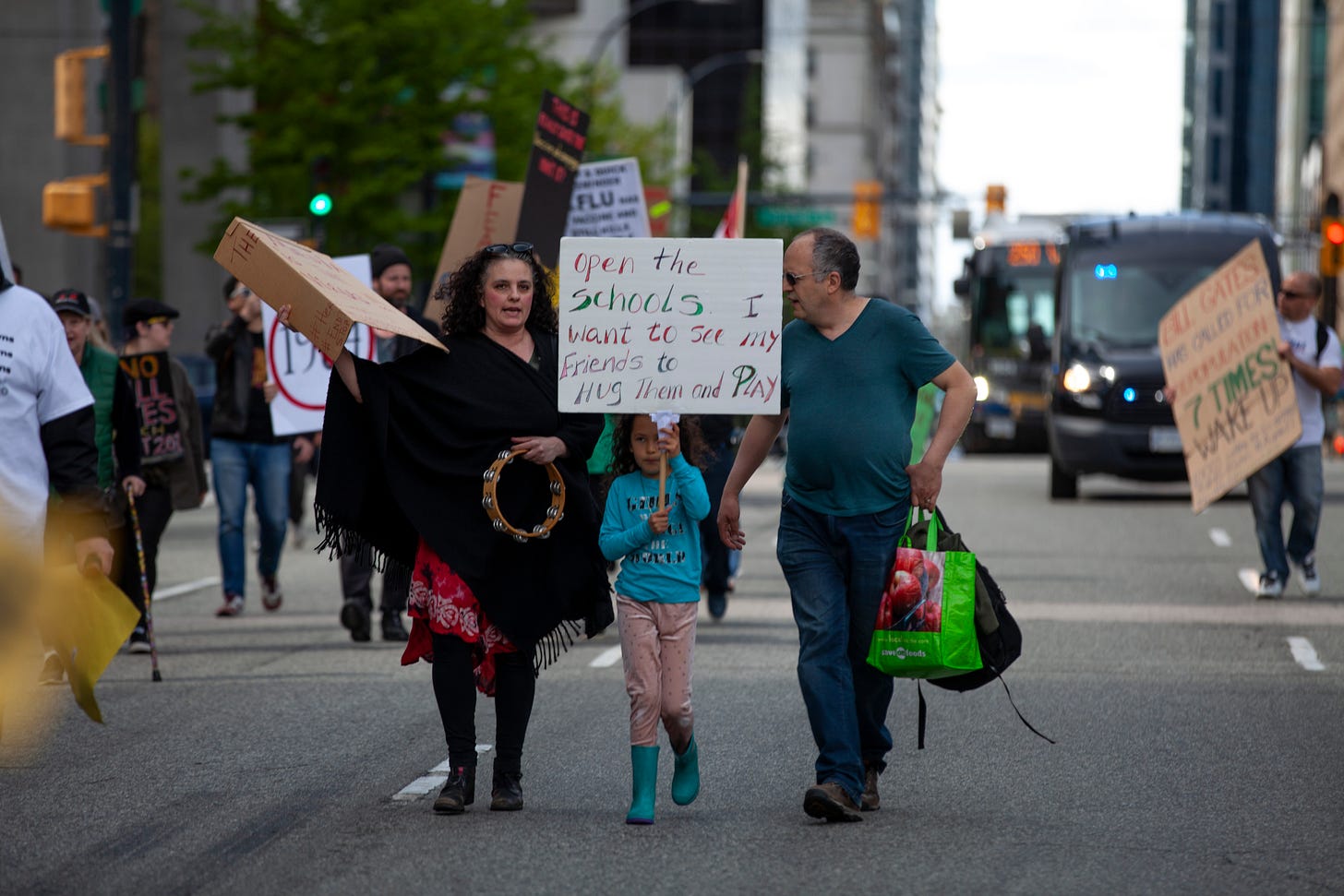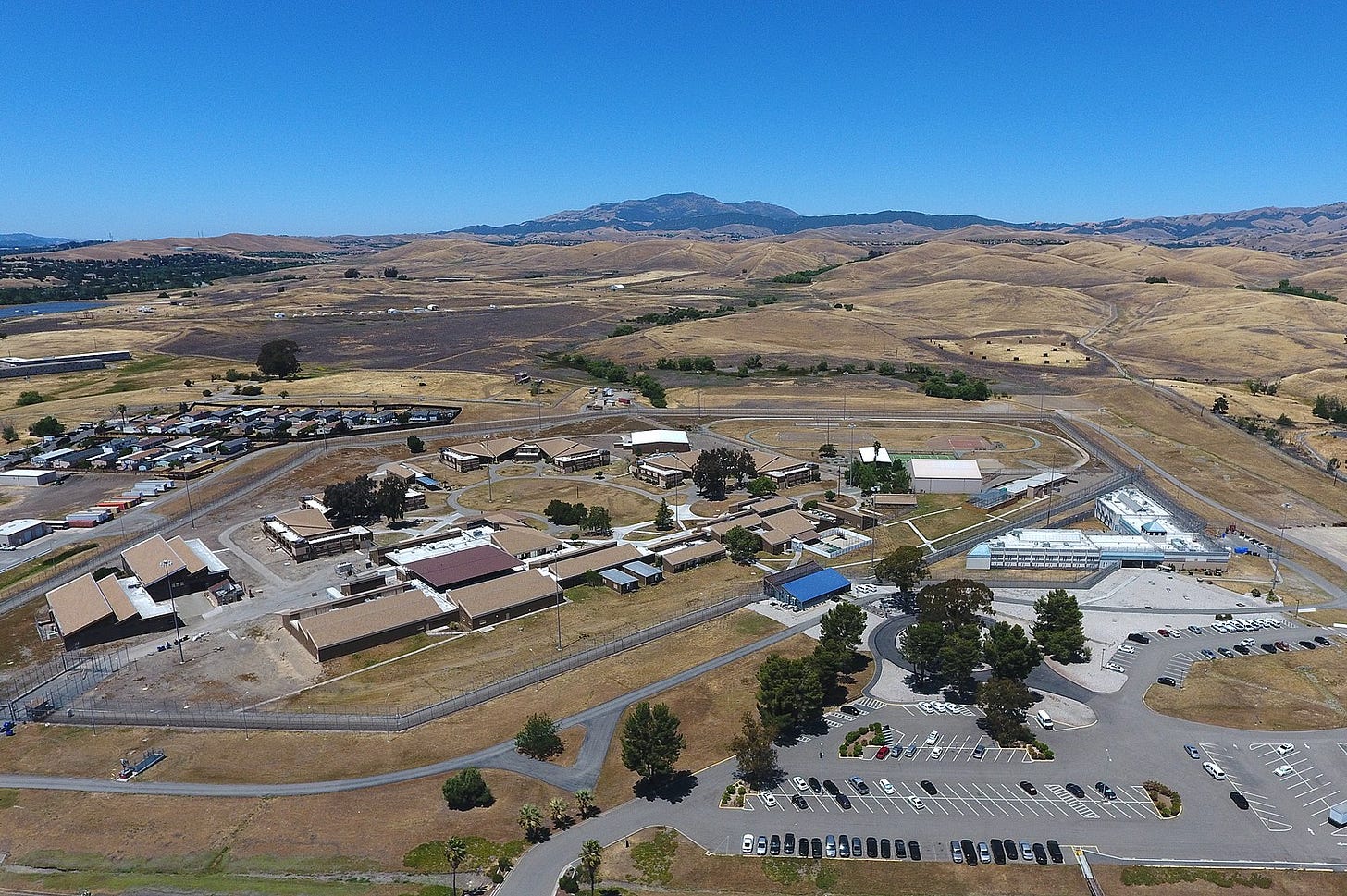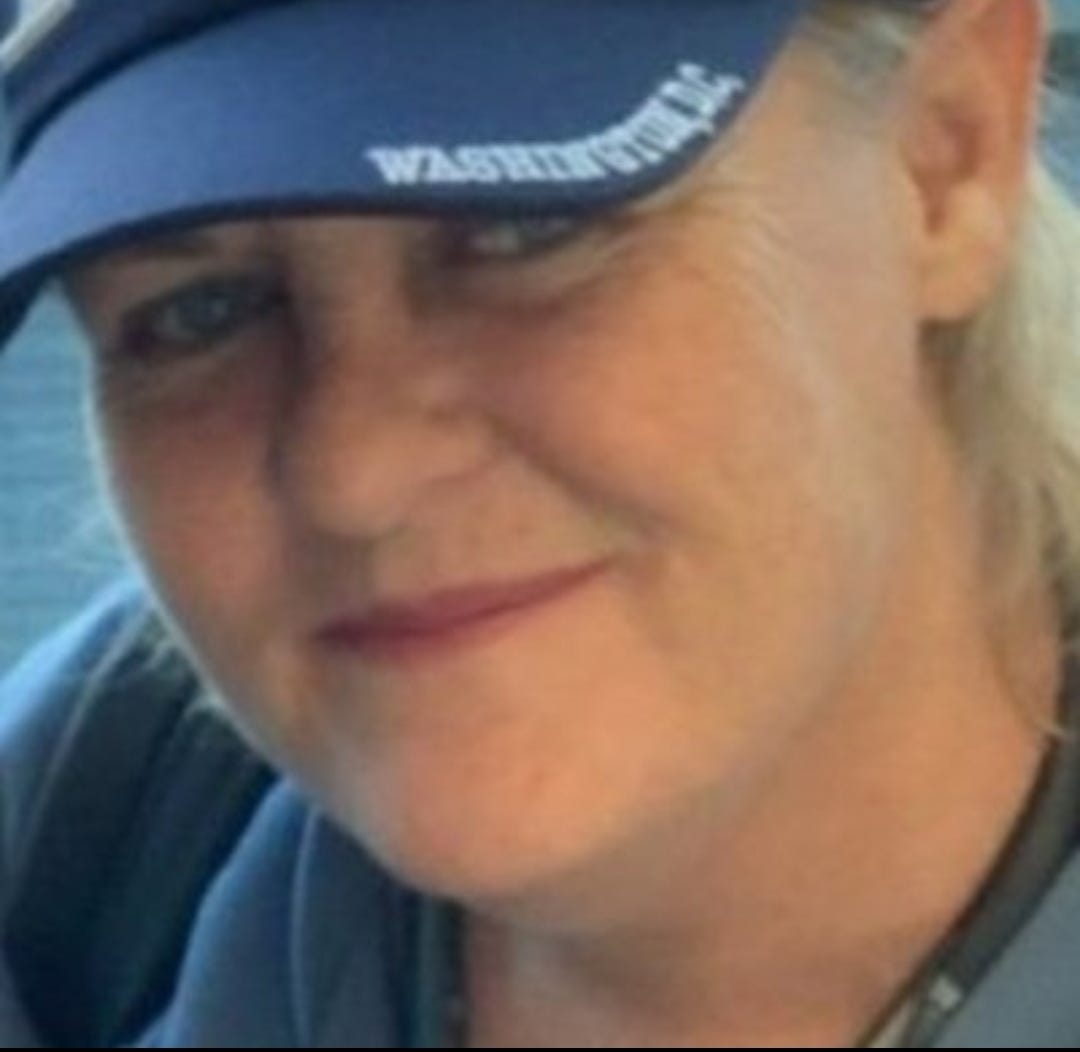She Went to Jail After Jan. 6 -- and It Opened Her Eyes to the Need for Prison Reform.
People can change. Danean MacAndrews's story shows how.
Editor’s note: The following story could be challenging for people to read if they come into it with a lot of preconceived notions. I’m sure some people have no interest in reading the point of view of someone who was arrested following the January 6th protest and riot at the U.S. Capitol. Others might say that they simply don’t have any sympathy for people who are behind bars for serious crimes. But I encourage you to read this story with an open mind. I hope it sets the tone for the kind of reporting I want to do at this site.
Danean MacAndrew isn’t your typical criminal justice reform advocate.
She’s a long-time Republican voter who has never considered herself very politically active. For most of her life, she had little concern for people who go to prison. But that all changed when she became one of those people after taking part in the January 6th protests inside the U.S. Capitol.
The experience opened her eyes to the humanity of people behind bars, and she’ll never be able to look at the system the same way again — and she wants to make sure other people learn from her experience.
This is her story.
MacAndrew, a native of Orange County, California, lives in her family home. She grew up in that home and moved away, later coming back to the area to care for her elderly parents.
With a Masters in neuroscience, she wasn’t able to find a job, so she instead started her own business selling CDs featuring old-time radio shows like Gunsmoke.
Between caring for parents and working odd jobs in addition to her business, she didn’t really have time for politics. She had typically voted Republican, but she wasn’t the kind of person to get involved deeply in campaigns. In 2016, she held her nose to vote for Trump but was never a die-hard fan of the GOP.
But then the COVID-19 lockdowns hit.
“I thought I have to pay attention to politics again because it’s affecting my life, daily,” she explained in an interview.
In May of 2020, she started going to Reopen California rallies to protest against the lockdowns. While at these rallies, she met people who challenged her to look more deeply into Trump. When she started watching Trump’s events — like his daily COVID-19 press conferences — she was shocked at how different the president seemed from what she assumed. She slowly became what she considered to be a Trump supporter.
She started going to more and more anti-lockdown events and Trump rallies as well. While she still didn’t consider herself any kind of political fanatic, she found herself finding connection in a time of social isolation.
“It was a sense of community,” she explained.

By time the presidential election rolled around, Danean connected not only the local pro-Trump, anti-lockdown community but also to a similar community online. She had become an avid user of social media.
Like most backers of Trump, she was sympathetic to his claims that the election was unfair. She decided to go to Washington, D.C. for the January 6th protest.
The decision to attend the rally was as much personal as it was political. With her parents having passed away in recent years and her brother having died of an overdose in the past year, MacAndrew noted that she wasn’t able to see her family during Thanksgiving or Christmas as usual.
“I just needed something to look forward to, to get me through Christmas. I think I booked it on the 23rd,” she said of her trip to the nation’s capital.
MacAndrews didn’t plan to end up in the U.S. Capitol. Alongside thousands of others that day, she first watched Trump’s speech in the morning, where he railed against what he perceived as an unfair election in the fall.
Due to back issues resulting from a being hit by a car as a teenager, she actually left the rally early to stretch out and find her backpack to take some Tylenol. Then she saw a large group of people carrying a large American flag. As an amateur photographer, she wanted to snap a photograph of it.
She followed the crowd to the Capitol and got there a little after 2:30 in the afternoon, more than an hour and a half after the building had been breached. She heard people saying that they’re letting protesters into the building.
“And I’m like that’s awesome. I’m going to get amazing footage in there, so I went into the Capitol,” she recalled.

She estimated she about eight minutes in the building, filming footage that she was eager to share online. Eventually, she heard orders from Capitol police to exit, so she left.
MacAndrews said that during her short foray into the Capitol, she never saw any violence and was actually surprised to hear about it later. She knew something was amiss when social media accounts started quickly being pulled off of Twitter following the Capitol riot; her own account was suspended when she was on the plane ride home.
(As an aside, when she was booted from Twitter, she turned to the far-right social media service Gab to continue to post about the event. She told me can’t stand the website — “the antisemitism on there is sickening” — but she had nowhere to go after the initial crackdown after Jan. 6th. This anecdote demonstrates that when we censor, the people being censored often end up being exposed to even more extreme forums or ideas.)
After reading stories about other people being arrested for their activities on Jan. 6th, she knew that her turn would come eventually.
In late September, FBI agents showed up at her door in California. She complied with them and told them about everything she did at the Capitol. She immediately went to a lawyer, but quickly learned how expensive good legal representation can be in this country.
“He’s like, oh yeah, $10,000 retainer, $500 an hour, I’m like OK yeah I can’t afford any of that. So now what?” she explained.
The lawyer pointed her in the direction of a public defender, who ended up representing her throughout the length of her case.
She was charged with four misdemeanors related to unlawful conduct and entering a restricted building. Her friends, remaining family, and public defender all pressured her to take a plea deal. Many Jan. 6th defendants who had faced similar charges who took plea deals were able to avoid prison time. In her interview with me, MacAndrews didn’t deny that the protest went out of control and that some of the people who had been violent probably should’ve gone to prison.
But MacAndrews felt like admitting guilt in her case would be lying.
“I said I’m not going to lie under oath and say that I knowingly went into a building I wasn’t allowed to be in. That’s not true,” she explained.
She truly believed that she was allowed to enter the Capitol that day because no one stopped her. And she was willing to go to trial for it.
MacAndrews was found guilty, and the judge believed that she needed to go to prison because she refused to accept responsibility. She was sentenced to 90 days behind bars.
MacAndrews was assigned to a facility called FCI Dublin located in Dublin, California.

She was stripped searched for the first time in her life, and when she walked into the U-shaped area where the inmates sat in their cells, they all looked her over. While the experience was intimidating, she recalled that she had been mentally preparing for it for months.
Her cellmate taught her how to tie her flat sheet into a fitted sheet to fit her bed; she also introduced her to the prison library. Before long, it was bedtime and she was sound asleep.
When she woke up the next day, she was confronted with the reality that she was in prison.
“I remember waking up and just seeing this white concrete wall, brick, cinderblock painted white wall,” she explained, saying that she learned to manage with the new reality that she was in.
There were no other January Sixers at FCI Dublin. Instead, her fellow inmates were in for a range of crimes, ranging from nonviolent misdemeanors to women who had filmed their husbands abusing their children and murderers.
Yet even when confronted with prisoners who had committed heinous crimes, she found herself being unable to deny their humanity. She quickly learned, pouring through the computer in the prison, that a majority of women who end up behind bars had been sexually assaulted in the past.
She thought about her own childhood and related it to the people she met behind bars.
“I was molested as a kid, and I’ve been raped. So I think that just speaking for myself like, it labels you and kind of like makes you a throwaway. Like a societal throwaway…it felt like the people I was incarcerated with, primarily were just throwaways,” she reflected. “Like they were the people society just threw away and it broke my heart.”
MacAndrews noted that far from being the kinds of one-dimensional monsters you might expect from popular culture depiction of prisoners, the inmates had far more depth as human beings.
“A lot of them were amazing and kind and generous. We would look out for each other,” she said.
She offered the example of women who would make phone calls to the outside where they would be faced with heavy subjects — like dealing with elderly parents who are dying.
“When people got off a hard call…they’d be crying and the rest of us would just be there to hug them or pray with them or to listen,” she said.
She found the culture within the prison to be remarkably communal.
“There was a lot of solidarity, I would say. A lot of us watching out for each other,” she said. “Like, if somebody lacks something, if somebody has a headache, like, you can't go to medical for it, you just go, you know, cell to cell and say, Hey, do you have any Advil or Tylenol and people [would] always be willing to help out with that.”
The experience was life-changing for MacAndrews.
For years, MacAndrews had adopted the attitude that people like those she was incarcerated with were deserving of little sympathy. She hand long believed that if you don’t want to do the time, just don’t do the crime. But that all changed once she was there herself.
“I just didn’t take the time to think through it until I was in that circumstance,” she said. “I’m embarrassed and ashamed that I didn’t and that it took me being thrown into the system to actually look at the other people that were in the system.”
Now, months after being released from prison, she has become an advocate for reform.
She recalled the experience of a guard being cruel to her — yelling and cursing — and offered her own idea for prison reform.
“I think honestly the best thing to do would be to make anybody who’s going to become a guard have them experience three days in prison before they’re allowed to become a guard so they understand what dehumanization feels like, how it feels to be not looked in the eye when you greet someone, how it feels to be seen more as an animal than a human, I think that if the guards would be able to feel the way that feels, then maybe they wouldn’t do that to us,” she said.
She also proposed that nonviolent offenders to be steered away from prison altogether, something she said she would not have endorsed before going to prison herself.
Still, she has frequently encountered pushback to these ideas while talking about the need for reform.
“I just say, you have no idea until you’re in it what it’s like…you have no idea how people get caught up in the system. It doesn’t mean they’re lifelong career criminals, they might’ve had just a really stupid thing that they did,” she said.
After all that has happened in the interim, MacAndrews doesn’t regret having spent time behind bars.
“I’ve gained experience with the system. I’ve gained a voice to be able to speak for people who have gotten their voices taken from them. I’ve gained the experience to…when somebody is going through the system for the first time, I can kind of tell them what to respect. I’ve gained internally a lot of compassion and understanding for people who wouldn’t have bene on my radar before.”
Since leaving prison, she has been applying for jobs but has yet to land a position. But whatever happens next, she will continue to speak out for those who are behind bars. She was especially heartened by a new bipartisan bill co-written by Georgia Democratic Sen. Jon Ossoff and Indiana Republican Sen. Mike Braun that would strengthen oversight over America’s federal prison system.
“That’s super exciting,” she said of the new law. “I’m stoked on that.”
It would be easy to dismiss MacAndrews’s story as a one-off.
Sure, occasionally people change, but most people never do, a cynic would say.
I could also see a reader belittling her for being unwilling to take prison reform seriously until it impacted her personally.
Why didn’t she care before? someone else might ask.
But it’s important to remember that nobody emerges from the womb all-enlightened (except maybe Shah Rukh Khan, I have yet to discover a single flaw he possesses.)

In the early 20th century, Harvard social psychologist Gordon Allport theorized that when people from bitterly divided groups come together and get to really know each other, they tend to get along better. He called his idea intergroup contact theory.
But he was quick to note that this contact has to be under certain conditions — after all, slave masters and their slaves had plenty of contact, and nobody would argue that Jefferson Davis wasn’t prejudiced.
Doing it right means having the support of legitimate authorities, a common sense of goals and interdependence, and a sense of having equal status.
When MacAndrews went to prison, she lived the same life as her fellow prisoners. Everyone was able to see their cellmates as people — not some alien group with whom they have nothing in common.
That’s what I’m trying to do with this newsletter. I want people across the spectrum reading, commenting, and interacting. The number one thing driving our polarization is that we don’t have enough positive contact. This newsletter is an act of rebellion against that situation.
If you enjoyed this story, vote with your clicks — subscribe so I can start sending you more of them. Please share the newsletter with your friends, family, and coworkers.
I’d also appreciate it if you chipped in whatever you could. A $6 subscription helps me put more time and resources into the reporting and commentary I do here.
And let me know what you think below in the comments. I’m always looking for feedback and fresh ideas.




It's nice to read an honest account of a J6'er. I think history will show there was a small minority of violent bad actors and a lot of people who got caught in the moment but were not trying to do anything other than show their support for Trump. I think the Biden administration has cynically and despicably exploited J6 for political purposes without any regard for the lives of the people present. A compassionate justice system would have let most of these people off with probation.
This was fantastic, Zaid. I'm independent, but have been sympathetic to the "common" Jan 6 attendee. I'm curious how more left-leaning readers will process the piece. Compassion and empathy is severely lacking in today's political discourse. I hope this newsletter/site is successful and helps to ease the polarization.